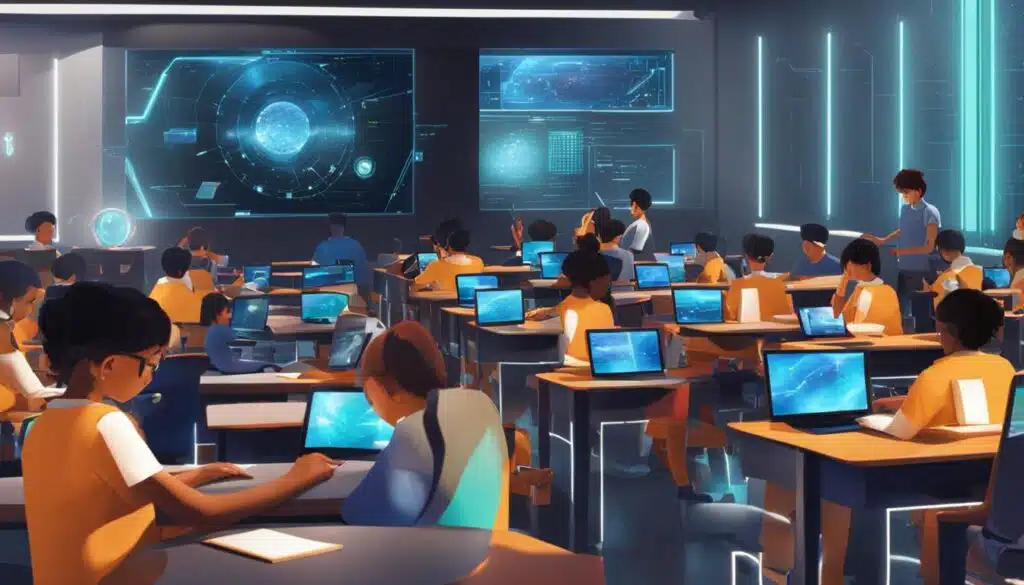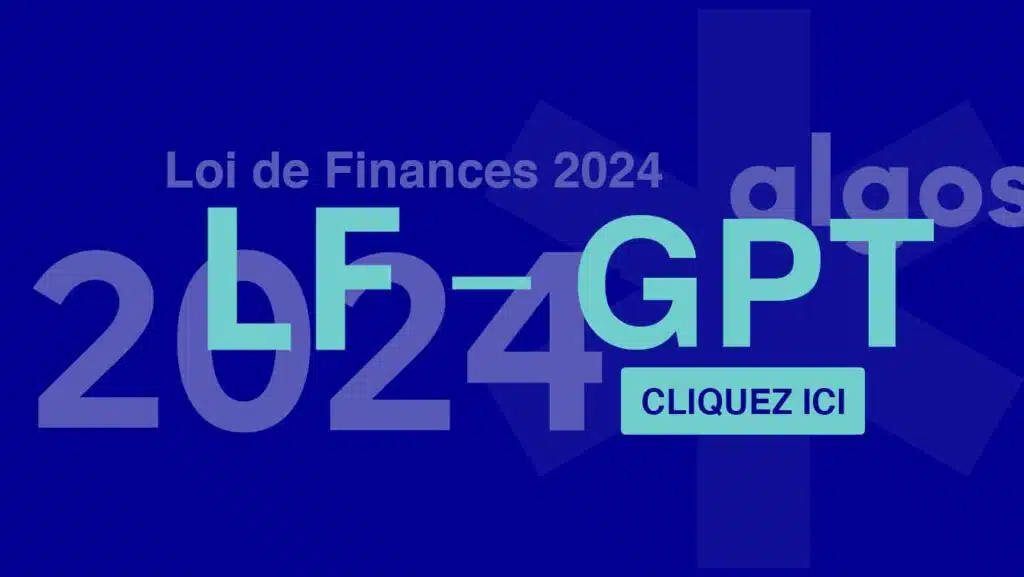Key points to remember
- Artificial intelligence is influencing the way we interact with technology on a daily basis.
- It represents an unprecedented technological revolution, with profound transformative potential.
- Its applications can be found in our smartphones, computers, cars and homes.
- AI promises to solve some of the most complex challenges, such as climate change.
- It also raises questions about its influence on human intelligence and decision-making.
The impact of artificial intelligence on our society: Definition of AI
Intelligence artificial definition encompasses the set of techniques and algorithms that simulate human abilities such as learning, problem solving, and communication. It relies on advanced technologies such as neural networks and expert systems to improve its performance and scope. As it evolved and thanks to themachine learning, AI has seen increasing deployment in various fields, demonstrating its growing integration into the economic and social sphere.
Among the sectors that are mainly affected by theAI evolution, we find:
- Automation of the repetitive tasks
- Complex analysis for medical diagnostics or logistics management
- Intelligent communication and interaction with humans
- Making informed decisions based on data
This rapid and spectacular evolution of AI is based on algorithms and some cutting-edge technologies, which has made it possible to resolve increasingly complex problems and respond to major societal challenges.
Intelligence artificial has the potential to become an incredible engine of change, solving some of the most complex challenges facing humanity.
It is important to understand that artificial intelligence does not replace human intelligence, but complements and enhances it. The interaction between these two forms of intelligence is what will make it possible to make the most of each to improve our daily lives and shape the future.
The impact of AI on cybersecurity and our data
The rise of artificial intelligence (IA) has led to significant advances in cybersecurity, enabling businesses and individuals to benefit from increased protection against cyber attacks increasingly sophisticated. The combination of AI technologies and human capabilities enables a proactive security and improved defense against online threats, protecting our data and finances.
Proactive security with algorithms
Through the use of artificial intelligence algorithms, businesses can proactively monitor their networks, detecting and countering cyber attacks potential threats. AI’s ability to analyze massive amounts of threat data makes it possible to quickly identify and respond to suspicious activity. This not only helps secure critical infrastructure but also protects sensitive user data.
AI in cybersecurity contributes to the security of critical infrastructures and data protection.
Strengthening defense against cyberattacks
Facing theconstant increase in cyber attacks, L'AI in cybersecurity provides enhanced mechanisms to protect organizations. The systems AI defense integrate early intrusion detection, enabling businesses to reduce the damage caused by attacks and strengthen their anti-cyberattack strategy. AI thus plays a key role in preventing cyber risks and data security.
- Real-time threat detection
- Automatic and adaptive intervention
- Continuous improvement through machine learning
Combining artificial intelligence technology with human expertise helps maximize the effectiveness of our cybersecurity systems. The benefits of AI in this area continue to grow, and as a society, it is essential that we continue to explore and invest in the potential of this technology to ensure optimal security.
Autonomous transport: a revolution in progress
Intelligence artificial is transforming the sector of autonomous transport, with vehicles capable of making decisions and carrying out maneuvers completely autonomously. This major innovation is the result of significant investments and constitutes a real techno-urban revolution.
THE smart cars allow for the reduction of traffic jams and pollution, thereby improving the quality of life in urban areas. Technological advances inAI and autonomous driving go far beyond cars: they impact public transport, infrastructure and urban services. In this context, smart cities are required to rethink their organisation and management.
The sector of autonomous transport has seen many advances. Our selection of innovations demonstrates the diversity of possible applications. Discover some examples:
- Fully autonomous vehicles for transporting people and goods.
- Semi-autonomous driving systems integrated into current cars, providing assistance to the driver.
- Autonomous shuttles for public transport, circulating in residential areas and industrial zones.
- Automated delivery drones, enabling faster and more efficient distribution of packages.
Autonomous transport is revolutionizing our mobility and represents a major step forward in the fight against pollution and urban congestion.
The implementation of autonomous transport also involves crucial challenges and issues to be addressed:
- Appropriate regulations to govern the use of these vehicles on our roads.
- The need to rethink infrastructure, particularly roads and parking lots.
- Training drivers and industry professionals to cope with these technological changes.
- Managing cohabitation between autonomous vehicles and conventional vehicles.
In short, the rise of autonomous transport The revolution caused by artificial intelligence is a source of profound transformations and new opportunities. We must prepare ourselves so that this revolution benefits everyone, by ensuring a responsible and controlled transition.
Hyper-targeted marketing with AI
The rapid development of theartificial intelligence (AI) has opened a new horizon in the world of marketing. Now, companies can offer extremely innovative offers and advertising messages. personalized, tailored to the needs and preferences of each customer. Thanks to the exploitation of data by AI, it becomes possible to address each user in a more relevant and contextualized way, thus improving the customer experience and boosting engagement and sales.
Personalization and improvement of the customer experience
L'hyper-targeting made possible by the use of AI in marketing allows the analysis and exploitation of a multitude of behavioral and transactional data relating to customers. This information offers a detailed and precise vision of the preferences, consumption habits and purchasing behaviors of each person, thus making the customer personalization more efficient.
Artificial intelligence optimizes marketing by enabling advanced personalization of offers and advertising messages.
By leveraging this data, companies are able to tailor their communications, offerings and services to the specific expectations of each customer. This helps to strengthen the relationship with the consumer, build customer loyalty and increase satisfaction and turnover.
| Aspects of Marketing Enhanced by AI | Application examples |
|---|---|
| Customer segmentation and targeting | Data analysis to identify the most profitable customer categories and those most likely to be interested in a specific offer or service |
| Content Personalization | Product and service recommendations tailored to each user's preferences and purchasing behaviors |
| Automation marketing | Sending personalized and relevant messages (emails, notifications, etc.) to customers based on their history of interaction with the brand |
| Optimization of advertising campaigns | Real-time adaptation of advertising messages and visuals based on customer responses and collected engagement data |
To go even further, recent technological innovations, such as deep learning (deep learning) and the neural networks enable AI to better understand and adapt to the complex nuances and emotional dimensions of the user experience, paving the way for ever more personalized and human interactions.
- AI Marketing: Marketing optimization through artificial intelligence
- Customer customization: adaptation of offers and advertising messages based on user data
- User experience: customer satisfaction and engagement with brand interactions
- Hyper-targeting: Precise customer segmentation and targeting to improve marketing impact
In short, AI is a real revolution in the world of marketing. Thanks to its potential for analysis and personalization, it is establishing itself as an essential strategic lever for companies seeking to strengthen their relationship with customers, optimize the effectiveness of their communication campaigns and increase their competitiveness on the market.
Impact of artificial intelligence on employment and the labor market
The implications of AI on the labor market are contrasted. It is causing the disappearance of some jobs while creating new ones, particularly in highly specialized fields such as programming and engineering. However, it is less affecting jobs requiring direct human interaction, such as home care or security.
The rapid development of theautomation led to the establishment of machines capable of performing repetitive tasks instead of human beings. While this may sound scary, it is important to recognize that AI has also generated new jobs which did not exist before.
Artificial intelligence has already begun to create new specialized jobs in technology, requiring workers to become more trained and specialized to adapt to these changes.
AI-related jobs require specific skills, which has led to a boom in education and training programs. For example, there is a growing demand for AI engineers, natural language processing specialists, machine learning researchers, and robotics experts.
- Creation of new jobs related to technology and programming
- Advances in research and engineering
- Increasing need for cybersecurity professionals to protect and secure AI systems
- Development of innovative training methods to adapt workers to new market realities
On the other hand, it is also necessary to take into account the professions that could be negatively impacted by AI. Some traditional professions could indeed face major challenges, such as:
- Industrial machine operators
- Call center agents
- In-store cashiers
To survive and thrive in this changing market, workers will need to adapt by learning new skills and specializing in areas where AI cannot replace human intervention.
In short, artificial intelligence has a considerable and often contrasting impact on employment and labor market. While it may make some jobs obsolete, AI also creates many new specialized jobs that require adaptation and continuous training of workers.
Education and training in the era of artificial intelligence
In the era ofartificial intelligence, it is essential to rethink our approach to teaching and learning.AI in education plays a key role in creating modern learning environments where students can benefit from an experience tailored to their individual needs. Through the educational technology, educational institutions can offer a adaptive learning and interactive.
Virtual and adaptive learning environments
L'AI virtual environment allows students to follow a personalized curriculum based on their skills, interests and goals. This approach promotes deeper and more meaningful learning. Virtual learning environments are able to analyze students' emotions and learning pace, making teaching more effective. Their advantages are numerous:
- Promote learning at your own pace
- Adapt teaching methods according to the needs of each learner
- Provide personalized support throughout the learning journey
- Facilitate collaboration between students and teachers
In addition, virtual learning environments are perfectly suited to the rapid evolution of technologies and the constant need to train in the latest skills.
The following table illustrates some of the major applications of artificial intelligence in education:
| Applications | Benefits |
|---|---|
| Personalized teaching | Allows learners to follow a program adapted to their skills and interests |
| Virtual tutors | Promotes independent learning and provides personalized support to students |
| Speech recognition and machine translation | Makes education more accessible for students of all languages and cultures |
| Smart assessment tools | Allows you to more effectively assess learners' skills and provide personalized feedback |
In conclusion, artificial intelligence offers significant opportunities to revolutionize education and training. Virtual and adaptive learning environments allow students to benefit from a personalized and effective learning experience, thus contributing to better preparation for future challenges.
Integrating voice assistants into everyday life
THE voice assistants are increasingly present in our Daily AI, facilitating a large number of tasks and improving our access to information. These intelligent tools, such as Siri And Alexa, have become indispensable for many of us, from simply reminding us of events to managing our connected home.
In terms of customer service, voice robots provide natural and intuitive responses, simulating human interaction and improving service efficiency. From order management to product information, these assistants make our user experience more fluid and personalized.
Artificial intelligence brings a new dimension to our communication with businesses, making interactions more natural and user-friendly.
Here are some key benefits of using voice assistants in our daily life:
- Quick and easy access to information
- Automation of the repetitive tasks
- Personalized assistance based on our preferences and habits
- Improving accessibility for people with disabilities
- Multilingual interactions
It is important, however, to remain vigilant in the face of the data security and to the protection of our privacy when we use these technologies. Although the voice assistants bring great comfort in our daily lives, they also raise questions about the management of personal data and the confidentiality of the information processed.
In short, the voice assistants have become an integral part of our daily lives, making our lives and interactions with businesses easier. However, it is essential to consider the privacy and security aspects of using these innovative technologies.
Current progress and limitations of artificial intelligence
Machine learning and advances in techniques artificial intelligence (AI) have paved the way for many innovations and improvements in various sectors. However, AI would be nothing without quality and sufficiently reliable data. In addition, it reaches certain limits in the face of human creativity and originality.
AI and data quality
There AI data quality is a crucial issue to take advantage of automated learning and avoid the algorithmic bias. Indeed, without reliable data and accurate, AI is not able to provide relevant results. This highlights the importance of careful data collection and analysis, as well as the need to address any issues that may be encountered.
“Artificial intelligence is only as good as the data it is based on.”
Considering things like source diversity and handling missing or erroneous data is essential to ensuring the quality of the information used by AI.
Intelligent machines vs human creativity
Although artificial intelligence has the potential to significantly optimize tasks, it cannot yet compete with human innovation and creativity. Some inherently human skills, such as critical thinking, complex problem solving, and adaptability, remain beyond the reach of intelligent machines.
- Ideation and artistic creation
- Innovative problem solving
- Adaptation to changing situations and environments
Thus, it is necessary to find a balance between the AI potential and the contribution of human creativity to create innovative and relevant solutions.
| Appearance | Artificial intelligence | Human creativity |
|---|---|---|
| Problem Solving | Excellent for well-defined problems and specific tasks | Essential for complex problems and lateral thinking |
| Learning | Automated learning from data | Experience, intuition and curiosity |
| Innovation | Optimization and continuous improvement of processes | Creation of new concepts and ideas |
In conclusion, it is crucial to take into account the limits of artificial intelligence while exploiting its potential to develop innovative and relevant solutions adapted to the challenges of the 21st century.
Societal opportunities brought by AI
Artificial intelligence opens up a wide range of AI possibilities to improve our daily lives and solve complex societal problems. Among the areas where thesocietal impact AI Particularly notable are public health, road safety, the creation of innovative products and services and the personalization of education.
In public health, artificial intelligence offers opportunities to improve disease prevention, diagnosis and monitoring. Thanks to thetechnological innovation In AI, healthcare professionals can now predict and detect serious pathologies more quickly, thus offering better chances of recovery for patients.
AI is also contributing to significant advances in environmental sustainability, optimizing energy management and helping to create green technologies.
Road safety is also improving thanks to artificial intelligence and autonomous cars. These technologies allow for better analysis of traffic situations, reducing the risk of accidents and improving driver responsiveness to unexpected obstacles.
When it comes to creating innovative products and services, AI and its learning and analysis capabilities enable companies to offer advanced technological solutions that are tailored to consumer needs. Moreover, these innovations extend to all sectors, from industry to commerce to public services.
| Domain | AI technological innovation |
|---|---|
| Health | Personalized diagnosis and monitoring |
| Transportation | Autonomous and connected cars |
| Education | Adaptive learning and interactive |
| Environment | Optimized energy management and green technologies |
Finally, artificial intelligence plays a key role in the personalization of education. Through data analysis and virtual learning environments, teachers can adapt their teaching approach according to the pace and needs of each student, for more individualized support for education.
To take full advantage of the possibilities offered by AI, it is important to continue to explore its possible applications and to deploy this technology in a responsible and ethical manner, in order to improve our AI and daily life and to build a caring and sustainable future for all.
Ethical challenges and potential risks of AI
Advances in AI pose significant ethical challenges and potential risks. Questions ofAI and Privacy and of human rights and AI are at the heart of concerns, particularly regarding the reach of online profiles and the surveillance of individuals' behavior on a large scale.
Privacy and Human Rights Issues
The rise of theAI influence on society creates major challenges for the protection of personal data and the preservation of privacy. AI algorithms can easily access and process sensitive information about the population, calling into question the respect for individual freedoms and AI ethics. These issues highlight the importance of regulation and the responsibility of the actors involved in the development and exploitation of artificial intelligence technologies.
The duality between technological facilitation and dependence
The rapid democratization of AI has undeniably simplified our daily lives and automated repetitive tasks. However, this AI dependency can lead to massive job losses and imbalances in access to information. In addition, theexcessive automation and the technological dependence could have negative impacts on individuals' ability to acquire and develop non-delegable skills.
It is crucial to find a balance between the beneficial use of AI and the prevention of automated over-reliance. Governments, businesses and individuals must adapt to these developments, exercising discernment and a certain caution in the face of technological innovations.
The ethical issues and potential risks of AI must be integrated into the overall thinking, in order to preserve human values and fundamental rights.
- Protection of privacy and human rights
- Ethical principles in artificial intelligence
- Regulation and responsibility of actors in the exploitation of AI
- Balance between facilitation and technological dependence
Conclusion: Is artificial intelligence impacting our society?
Artificial intelligence is transforming our society in profound and diverse ways, with the potential to significantly impact every aspect of daily life. It offers immense opportunities, but it also presents major challenges and potential risks. Through open dialogue, responsible innovation, and thoughtful regulation, we can fully harness the power of AI while managing its risks for the future.
The opportunities presented by AI include advances in public health, education, road safety and the creation of innovative products and services. However, it is crucial to address ethical challenges and issues of privacy, human rights and technological dependence which accompany the evolution of this technology.
Ultimately, it is essential to continue exploring and debating the implications of AI on our society, placing humans at the center of the discussions and seeking a balance between the beneficial use and prevention of risks related to artificial intelligence. It is up to us to seize this opportunity and build a future where AI will improve our quality of life while respecting our values and aspirations.












